|
|
|
Sort Order |
|
|
|
Items / Page
|
|
|
|
|
|
|
| Srl | Item |
| 1 |
ID:
144376
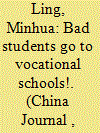

|
|
|
|
|
| Summary/Abstract |
China’s second-generation rural-to-urban migrant youth, who grew up in their parents’ adopted cities, are still denied urban residential status and suffer from the institutional closure of higher education opportunities. This article explores in ethnographic detail the experiences and subjectivities of migrant youth in Shanghai who since 2008 have been channeled to secondary vocational schools. It highlights the direct involvement of the local state in reproducing a social hierarchy in which migrant youth provide cheap labor for manufacturing and low-skilled service industries. It reveals how contention over the limited choice of majors and career trajectories persists between state intention, market demand and individual aspirations. The time and space provided by vocational schooling enable migrant students to gain urban habitus and form networks across boundaries. Vocational schools have thus become a unique site for studying education and class reproduction in a late-socialist context.
|
|
|
|
|
|
|
|
|
|
|
|
|
|
|
|
| 2 |
ID:
147830
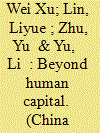

|
|
|
|
|
| Summary/Abstract |
The transformation to a socialist market economy in China has
unleashed millions of migrants from the rural interior searching for
better economic opportunities in coastal areas over the past three decades.
|
|
|
|
|
|
|
|
|
|
|
|
|
|
|
|
| 3 |
ID:
192330
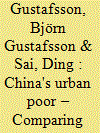

|
|
|
|
|
| Summary/Abstract |
Using data from the China Household Income Project in 2013 and 2018, this paper studies relative poverty among rural hukou holders living in urban China and urban hukou holders. People living in households with an income below a fixed percent of the median per-capita income and wealth below the same fixed percent of the median per-capita wealth among urban residents are deemed as relative poor. Although migrants with rural hukou living in urban China were more prone to twice poverty than urban residents in 2013, this was not generally the case in 2018.
A multivariate analysis shows several factors to be related to the probability of being twice relative poor. Even considering these factors, a rural hukou status increased the probability of being twice relative poor in 2013. In contrast, such an excess risk of being twice relative poor was much lesser outspoken in middle and low-ranking cities in 2018. However, rural to urban migrants living in high-ranking cities had a somewhat higher risk of being relative poor than urban residents with the same characteristics in 2018.
|
|
|
|
|
|
|
|
|
|
|
|
|
|
|
|
| 4 |
ID:
085906
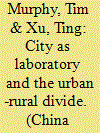

|
|
|
|
|
| Publication |
2008.
|
| Summary/Abstract |
This paper focuses on the private property and its limits in urban China.It explores the emergence of urban property markets; urban property-holding in relation to the complexity of urban governance; "minor property rights apartments" that form a de facto real estate market and cross over the urban-rural divide; the "grey areas" of blurring legal and administrative boundaries in modern China; and recent change to the rural land system and the rural-urban divide. The conclusion flags the theme of the city as laboratory with regard to the blurring legal and governmental urban-rural distinction.
|
|
|
|
|
|
|
|
|
|
|
|
|
|
|
|
| 5 |
ID:
114226


|
|
|
|
|
| Publication |
2012.
|
| Summary/Abstract |
This essay discusses an interesting paradox forming in urban China today. Using a Weberian framework, it argues that recent changes in state policy, educational structures, and forms of social status are producing new social classes. Yet at the same time, the very processes and policies that enable these new class formations also mitigate against the development of class consciousness. Based on a year of ethnographic research in two vocational secondary schools in Nanjing, this essay looks closely at the ways in which young people who are preparing to enter the lower echelons of the urban service economy are potentially part of a new social class, but one with very limited potential to develop class consciousness.
|
|
|
|
|
|
|
|
|
|
|
|
|
|
|
|
| 6 |
ID:
146682
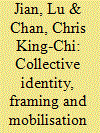

|
|
|
|
|
| Contents |
This study presents the case study of a collective action against a proposed industrial waste-water disposal project in the city of Qidong, Jiangsu province in 2012 to explore the role of collective identity in the formation and mobilisation of environmental protests in contemporary China. It is suggested that collective identity articulated through protest is not just a static property of a certain group of people based on their history, culture and locality. Collective identity also works as a flexible framing strategy that can be pragmatically constructed or reconstructed by the discontents, as it interacts with the specific political context in the process of mobilisation.
|
|
|
|
|
|
|
|
|
|
|
|
|
|
|
|
| 7 |
ID:
161817
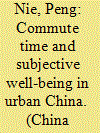

|
|
|
|
|
| Summary/Abstract |
Using data from the 2010 China Family Panel Studies, this study investigates the association between commute time and subjective well-being in a sample of 16- to 65-year-old employees in urban China. We find evidence that a longer commute time is associated with lower levels of both life satisfaction and happiness, especially when the commute times are extreme (≥ 1 hour per day). A multiple mediation analysis further indicates that the relation between commute time and happiness is partially mediated by the time spent on daily activities, particularly sleep. We also calculate the amount of income necessary to compensate an employee's loss in well-being at approximately 82 yuan per hour of commute time, implying that in urban China the annual loss of well-being amounts to around 10 billion yuan.
|
|
|
|
|
|
|
|
|
|
|
|
|
|
|
|
| 8 |
ID:
133192
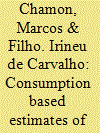

|
|
|
|
|
| Publication |
2014.
|
| Summary/Abstract |
This paper estimates the household income growth rates implied by food demand in a sample of urban Chinese households in 1993-2005. Our estimates, based on Engel curves for food consumption, indicate an average per capita income growth of 6.8% per year in 1993-2005. This figure is slightly larger than the 5.9% per year obtained by deflating nominal incomes by the CPI. We attribute this discrepancy to a small bias in the CPI, which is of a similar magnitude to the one often associated with the CPI in the United States. This result supports the view that Chinese price statistics are reliable. Our estimates indicate stronger gains among poorer households, suggesting that urban inflation up to 2005 in China was "pro-poor," in the sense that the increase in the cost of living for poorer households was smaller than for the average one.
|
|
|
|
|
|
|
|
|
|
|
|
|
|
|
|
| 9 |
ID:
146892
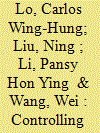

|
|
|
|
|
| Summary/Abstract |
This article traces the institutional development of environmental regulation in urban China, using data from three rounds of surveys of enforcement officials in the Guangzhou Environmental Protection Bureau in 2000, 2006 and 2013. We found that the changes to institutional contexts of regulatory control appear mainly in the fluctuating degree of support from various non-state actors, but not from government entities and regulated industries. While we detected visible organizational changes in local environmental enforcement bureaus, there was also organizational stability. First, the quality of enforcement officials has improved, as reflected by a higher level of education, first from 2000–2006 and then from 2006–2013. Second, the perceived value of enforcement officials in environmental protection was considerably enhanced in the period 2000–2006, and then remained stable from 2006 to 2013. Third, enforcement obstacles in terms of administrative ambiguity remained virtually unchanged from 2000 to 2013, while enforcement power deficit, resource scarcity and procedural ambiguity became more severe. Overall, the general perception of enforcement effectiveness at both the unit and organizational levels has remained the same over the past 13 years, whereas individual-level enforcement was perceived to have become more effective (with significant changes mainly taking place from 2006 to 2013). On the basis of these empirical results, we found that the institutional conditions for stricter enforcement in Guangzhou were visibly improved from 2000 to 2006, but only modestly improved between 2006 and 2013.
|
|
|
|
|
|
|
|
|
|
|
|
|
|
|
|
| 10 |
ID:
084461
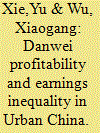

|
|
|
|
|
| Publication |
2008.
|
| Summary/Abstract |
Prior research has debated the relative importance of such factors as human capital, political capital and region in determining workers' earnings in reform-era urban China. This article argues that a main agent of social stratification in contemporary China continues to be the danwei, the work unit. Using data from a 1999 survey we conducted in three large Chinese cities, Wuhan, Shanghai and Xi'an, we assess the extent to which workers' earnings (including regular wages, bonuses and subsidies) depend on the profitability of their danwei. Results show that the financial situation of the danwei is one of the most important determinants of earnings in today's urban China. Furthermore, the importance of danwei profitability does not vary by city or by employment sector.
|
|
|
|
|
|
|
|
|
|
|
|
|
|
|
|
| 11 |
ID:
128527
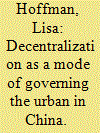

|
|
|
|
|
| Publication |
2013.
|
| Summary/Abstract |
This paper considers what a Foucauldian-informed analysis of decentralization and urban transformation offers to current debates. It analyzes decentralization as a new regime of governing, in contrast to many studies that treat it as a policy process, objective or outcome aimed at alleviating some problem of centralized authority. Rather than understanding decentralization as less state governance, this paper asks how practices such as local autonomy are in fact technologies of governing the urban. Decentralization is analyzed then not simply as an absence of some central state power, either in the political or fiscal realm, but rather, as new mechanisms of governing the urban, which are linked with the regulation and constitution of subjects. The paper focuses on an aspect of decentralization that typically is under-examined: the decentralization of welfare provisioning in urban China. Under high socialism of the Maoist era, social services for urban residents were distributed by the state, through the work unit (danwei) as part of the planned economy. In recent years, however, major reforms have been put into place to diversify the ways in which social services are delivered, under a general rubric of decentralizing the distribution away from the state. Based on anthropological research in Dalian, a major port city in northeast China, this paper examines a new social practice and subject form that has emerged with new ways of caring for those in need in the city: volunteerism. By focusing on this resulting social form, the paper argues that we may better understand how decentralization is not a singular process with multiple outcomes, but rather, a complex assemblage of elements that includes technical questions about how to govern as well as normative practices of subject formation. An analytical disaggregation of these elements also allows us to avoid the assumption that decentralization necessarily contains certain characteristics, or that it will lead to particular kinds of political and social forms.
|
|
|
|
|
|
|
|
|
|
|
|
|
|
|
|
| 12 |
ID:
181208
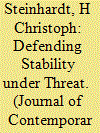

|
|
|
|
|
| Summary/Abstract |
How does the elevated threat of protests during sensitive periods affect state repression in a high-capacity authoritarian regime? Drawing on a dataset of over 3,100 protests in three Chinese megacities, this study provides three key findings: first, the frequency of protests before and during national-level focal events and subsequent to national-level disruptive events is depressed, suggesting preemptive repression is taking place. Second, the likelihood of responsive repression is marginally reduced before and during local-level focal events and slightly elevated after national-level disruptive events. Third, contention is intensified when local political elites meet. Sensitive periods do not bring contention to a standstill and costly bursts of responsive repression were not observed. Stability maintenance during times of increased regime-vulnerability was thus less rigid than often assumed.
|
|
|
|
|
|
|
|
|
|
|
|
|
|
|
|
| 13 |
ID:
186460
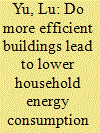

|
|
|
|
|
| Summary/Abstract |
Over the last decade, residential energy consumption has become a major contributor to global energy use and carbon emissions, and its contributions, especially in developing regions, are accelerating more rapidly than those of the industrial sector. The energy efficiency of the building stock has shown great potential for reducing household energy consumption through advanced measures on the envelopes of buildings, such as the use of advanced construction materials and improvements in building structures. Thus, policies have been implemented to improve energy efficiency and reduce carbon emissions from buildings. This paper analyses survey data from Guangzhou, a megacity with a subtropical climate in South China, to estimate the effects of energy efficiency on the energy consumption of residential buildings. We apply an econometric approach to examine the effects of energy efficiency, and we employ instrumental variables to address problems of endogeneity. The results show that greener buildings, in terms of advanced building materials and structures oriented towards high energy efficiency, reduce the carbon footprints of households. Additionally, households with low income levels and those with environmentally friendly energy consumption behaviour are likely to benefit from living in energy efficient buildings more than other households. Finally, suggestions on ways to improve energy policy and methods to reduce household energy consumption and carbon (CO2) emissions are presented.
|
|
|
|
|
|
|
|
|
|
|
|
|
|
|
|
| 14 |
ID:
163337
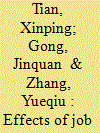

|
|
|
|
|
| Summary/Abstract |
In the late 1990s, the Chinese government initiated dramatic reform in its state-sector enterprises, which caused millions of workers to lose their jobs. Using data obtained from the China Health and Nutrition Survey, we employ fixed-effect methods to explore the effects of displacement on the dismissed workers' health status. Our results show that these displaced workers are more likely to report having poor health and suffer from chronic conditions, such as hypertension and stroke. The effect on chronic conditions appears only in the long run. In addition, we find that the displaced workers are less likely to be covered by health insurance, less likely to see a doctor when they are ill, and more likely to engage in unhealthy behavior such as smoking, which may help explain the poor health outcomes of these individuals. Moreover, we show that the health effects are heterogeneous among different groups of individuals.
|
|
|
|
|
|
|
|
|
|
|
|
|
|
|
|
| 15 |
ID:
159545
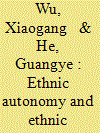

|
|
|
|
|
| Summary/Abstract |
To balance ethnocultural diversity with national integration, the Chinese government started formulating a series of ethnic policies in the early 1950s, including policies on identifying and classifying ethnic groups, a system of regional ethnic autonomy, and a set of preferential treatment policies toward 55 minorities. This article aims to examine socioeconomic disparities between ethnic minorities and the Han majority in China, focusing on the role played by regional ethnic autonomy. Based on a large sample of China's mini-census data collected in 2005, we show that among nonfarm working populations, minorities are more likely than the Han to become managers/professionals or obtain high-status occupation, regardless of whether they are living in their own autonomous jurisdiction or other places. Minorities are paid lower wages, however, even after controlling for other characteristics, and the gap is even wider in autonomous jurisdictions than elsewhere. Finally, children of mixed Han-minority marriages in ethnic autonomous jurisdictions are more likely to identify themselves as minorities, especially those holding urban registration status (hukou) whose parents have received more schooling. Our findings bear important implications for the current debate on ethnic policy in China.
|
|
|
|
|
|
|
|
|
|
|
|
|
|
|
|
| 16 |
ID:
121209
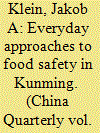

|
|
|
|
|
| Publication |
2013.
|
| Summary/Abstract |
The article explores how people in Kunming have interpreted and acted upon food-related environmental health threats, particularly within the contexts of everyday food shopping. It is argued that an increasingly intensified, delocalized food supply system and a state-led emphasis on individual responsibility and choice have produced growing uncertainties about food. However, the article takes issue with the claim that new forms of risk and institutional changes have produced "individualized" responses, arguing that many of the practices Kunmingers have developed to handle food-related risks and their understandings of what constitutes "safe" food have been developed within the frameworks of family ties and regional cuisine. Further, shoppers and purveyors of food have forged new ties of trust and re-emphasized connections between people, food and place. Nevertheless, concerns about the food supply are a source of discontent which is feeding into wider ambivalences towards modernization. This is particularly acute among the economically disadvantaged.
|
|
|
|
|
|
|
|
|
|
|
|
|
|
|
|
| 17 |
ID:
089975
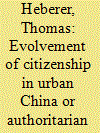

|
|
|
|
|
| Publication |
2009.
|
| Summary/Abstract |
Frequently, civil society is identified with an increase of associational life. Yet, in this article it is argued that the emerging of citizens and citizenship is a vital precondition for developing a civil society. Here I will focus on a concept of citizenship grounded in a local context. Accordingly, it focuses on both the public discourse on citizenship and the institutional effects with regard to citizenship generated by the establishment of urban neighborhood communities and the enhancement of participation. The author's hypothesis is that by virtue of newly established neighborhood communities in urban areas, a gradual transition from 'masses' to citizens seems to manifest itself. This transition process will be examined in four central fields: (a) community participation and grassroots elections; (b) self-administration (autonomy) and the attitudes of residents thereto; (c) the growth of individual autonomy; and (d) value engineering by the party state. As the institutional preconditions for a civil society in China are widely lacking, the party-state conceives its role in initiating them. It is precisely the combination of the top-down establishing of neighborhood communities and grassroots elections, mobilized participation and volunteers, which gives evidence of the party-state's intention to generate structures of an (illiberal and controlled) civil society. Citizen status has not yet been fully achieved in China; yet the state-led activation in urban neighborhood communities shows that the political leadership has decided to chart this course. Finally the article classifies the concept of neighborhood communities as a model of 'authoritarian communitarianism'.
|
|
|
|
|
|
|
|
|
|
|
|
|
|
|
|
| 18 |
ID:
162348
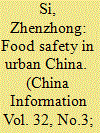

|
|
|
|
|
| Summary/Abstract |
Food safety has become an increasingly pressing sociopolitical issue in China due to the outbreak of food safety scandals since the 2000s. Existing studies have highlighted the socio-economic context of this issue, its drivers and implications. Yet, few studies have examined the perceptions of food safety conditions and strategies undertaken by consumers in their daily lives to cope with the challenge. Based on a city-wide survey of 1210 households and 36 interviews in Nanjing, China, this research adopts an ‘everyday’ perspective of analysis to investigate Nanjing residents’ perceptions of, and strategies to cope with, the food safety challenge. Perceptions include the severity of the food safety problem, the least safe foods, as well as causes and responsibilities. Coping strategies include various approaches to food access and food preparation. This article also compares the validity of potential sources of trust in food. On the one hand, the study demonstrates how the structural changes in China’s food system (i.e. chemical intensive food production and elongated food supply chains) constitute the major problems and causes of food safety issues. On the other hand, it reveals the considerable latitude within which Nanjing residents proactively exercise their agency when facing food safety challenges.
|
|
|
|
|
|
|
|
|
|
|
|
|
|
|
|
| 19 |
ID:
124651
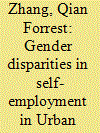

|
|
|
|
|
| Publication |
2013.
|
| Summary/Abstract |
This article presents the first quantitative analysis of gender disparities in self-employment in urban China. It documents the extent of gender income inequality in self-employment. By disaggregating self-employment into three occupational classes, it reveals the gender segregation within self-employment - women were concentrated in the financially least rewarding segment - and identifies it as a main source of gender income inequality. I examine a range of determinants of participation in self-employment, including family structure, family background and career history, and how their gender-specific effects contribute to gender segregation. Although using data from a 1996 national survey, this study captures two key processes that shaped the structure of self-employment in contemporary urban China: the restructuring of the state sector and the growth of financial returns and social status in the private sector, both of which contributed to the formation of gender segregation in self-employment.
|
|
|
|
|
|
|
|
|
|
|
|
|
|
|
|
| 20 |
ID:
101277
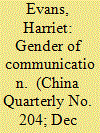

|
|
|
|
|
| Publication |
2010.
|
| Summary/Abstract |
In the flow of the material, cultural and moral influences shaping contemporary Chinese society, individual desires for emotional communication are reconstituting the meaning of the subject, self and responsibility. This article draws on fieldwork conducted in Beijing between 2000 and 2004 to discuss the gendered dimensions of this process through an analysis of the implications of the "communicative intimacy" sought by mothers and daughters in their mutual relationship. What could be termed a "feminization of intimacy" is the effect of two distinct but linked processes: on the one hand, a market-supported naturalization of women's roles, and on the other, the changing subjective articulation of women's needs, desires and expectations of family and personal relationships. I argue that across these two processes, the celebration of a communicative intimacy does not signify the emergence of more equal family or gender relationships, as recent theories about the individualization and cultural democratization of daily life in Western societies have argued. As families and kin groups, communities and neighbourhoods are physically, spatially and socially broken up, and as gender differences in employment and income increase, media and "expert" encouragement to mothers to become the all-round confidantes, educators and moral guides of their children affirms women's responsibilities in the domestic sphere. Expectations of mother-daughter communication reshape the meaning - and experience - of the individual subject in the changing character of the urban family at the same time as they reinforce ideas about women's gendered attributes and the responsibilities associated with them.
|
|
|
|
|
|
|
|
|
|
|
|
|
|
|
|
|
|
|
|
|